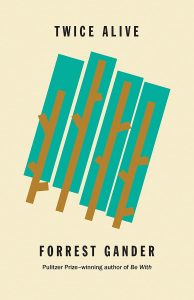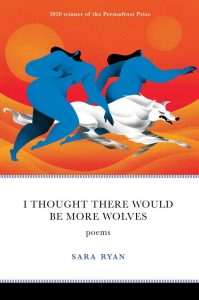


Twice Alive, by Forrest Gander. New Directions, 96 pp., $16.95.
Strip, by Jessica Abughattas. University of Arkansas Press, 75 pp., $16.95.
I Thought There Would Be More Wolves, by Sara Ryan. University of Alaska Press, 95 pp., $14.95.
It will no doubt be difficult to look back on the past year and a half and not let the pandemic divide our perception of events into a before and after. In the same way that any major tragedy affects a nation or the globe, Covid has reshaped the way we understand the purpose of life and how we come to grips with the emotional toll of death. Despite how much the pandemic has weighed upon us, the party, to use a tired cliché here, must go on. Although the return to normalcy has been interrupted by new strains of the virus and ideological neglect of basic reason and scientific understanding, we have no choice but to keep on living. Yes, we have regained some of what we have lost: air travel; large gatherings; the monotony of office life. But some constants have only intensified: our love of animals; skepticism of leaders; the need to discover more about ourselves in the face of so much uncertainty. It is precisely this last basic human necessity that the collections under review tackle. Whether set in an abandoned farm or at a dinner party surrounded by people who wish to be important, the works of Forrest Gander, Jessica Abughattas, and Sara Ryan not only give a glimpse of the before, but also highlight how one finds their place in our respective environments. They are artifacts that those fortunate enough to be in the after can look back upon, study, and find some aspect of their lives in. But in the same vein, they convey the world as it was, still is, and—as is perhaps every poet’s mission—as they would like for it to be.
I.
Forrest Gander has been a steady and important voice in American Letters for the past thirty years, and his latest collection, Twice Alive, is not merely an epilogue to his previous books, but rather a continuation that seeks to unearth the personal and environmental complexities of our past and present. Similar in overall structure to his previous book, Be With, Twice Alive takes a microscope to the natural environment while interweaving personal narratives that center on love, loss, acceptance, and closure. The poems can at times be scientific, rigid in their delivery, and lyrically foreign. In the first of three title poems, readers must navigate the tonal geography of “mycobiont,” “umbilicate,” “irenic,” “chanterelles,” “tomentum,” “photobionts,” and “lamellated”. The title poem initially feels like an abstract from a Nature article, but what Gander does so well is tie the observations into an awareness of one’s significance in the world:
Here, the speaker and his partner are secondary characters to the landscape and the animals that inhabit it. Not even the raccoon, always the cautious creature, has sensed their presence, despite how deep within the environment they have immersed themselves. In the late Chilean writer Roberto Bolaño’s magnum opus, 2666, Bolaño describes at length the murders of working-class women in the fictional town of Santa Teresa (what is supposed to be modern-day Ciudad Juarez), and when an American reporter happens upon the story, he is told, “No one pays attention to these killings, but the secret of the world is hidden in them.” In Gander’s poems, pages are indeed spent describing the environment, and although the readers’ attention may not live beyond these pages, there are secrets within this plant life that we must not ignore, not strictly because of its beauty and importance, but because it is our chance—as readers, citizens, humans—to take a backseat to what we might have not noticed before, and to appreciate what it means to be a part of something larger than ourselves.
Gander’s focus, however, doesn’t always prime the self-reflective aspects of his poems with the natural landscape. Instead, the environment is incorporated within events that have shaped the speaker’s memory, especially as it concerns loss and regret:
In “Pastoral,” the human element takes center stage, and we see a speaker burdened by the belief that life had been one way when in reality it wasn’t. The scene here is supposed to be a joyous one, ripe with celebration for a bride to be, and when you add the pastoral characteristics of rain and an abandoned farm, you would imagine that everything about that day would be soaked with blissfulness. But the speaker understands that our surroundings may hide a truth we had not initially seen, and only through reflection could the speaker have “look[ed] into that afternoon and seen / it closing.” Despite the beauty of the “old orchard” or the “swollen jackfruit [hanging] on slender limbs,” or the “Jacaranda perfume” infusing itself throughout that afternoon, it didn’t mirror the “last notes” that would come to define this day, and that would make the speaker question how he views whatever claim to happiness he thought he had.
While the personal is indeed woven through the observational, Gander understands the importance of stepping back when the content of the poem demands it. Yes, for the past few years Covid has defined how we move about the world, and will continue to define our future, but climate change has been affecting our planet for decades now, and with the increase in summer temperatures, stronger hurricanes, and fires that ravage forests all across the globe we no doubt have our work cut out for us on how we respond to this growing threat. In the section titled “Post-Fire Forest” in “Sangam Acoustics II,” the speaker examines the consequences of a forest fire, taking note of the “carbonized trunks” and the how the remains of the forest take “place / in the exclamatory mode”:
The forest has essentially turned to ash, and even though the “familiar sun” has risen, the speaker, at the end of the stanza, hints that the landscape ultimately has to heal itself— perhaps cynically, because the speaker understands that humans, as a collective, won’t give up convenience to allow even a small part of the earth to restore. Nevertheless, despite the speaker feeling dispirited and wondering how “to value that, walking through the wreckage,” a woodpecker answers the speaker’s companion’s call, and while they might not see the bird, the response is a sign of hope.
In “Rexroth’s Cabin,” the last poem in the collection, the speaker walks into an empty cabin, letting the reader know that although the previous owner straddles a space that is “here and not here,” everyone else is conscious enough to realize that “[their] mind, [their] happiness … is radiant.” If Gander’s poetry does anything, it reassures us of our importance, and it reminds us that the future, however uncertain it might be, is always ours to shape in our image.
II.
Regardless of what dictionary you refer to, the word strip will involve deprivation, and like any good reader, you will naturally think that Jessica Abughattas’ debut collection, Strip will peel back layers of situations, people, or memories in order to show what lies at their core. While there are layers to be peeled, Strip does not deprive; rather, Abughattas’ poetry seeks to reveal more of what wasn’t known before, and her poems give us reason to re-examine how we truly think of and navigate our surroundings.
Winner of the 2020 Etel Adnan Poetry Prize, Strip’s conversational yet deeply reflective tone documents everyday situations to find truths that must be confronted. The frankness at the beginning of the opening poem, “Dinner Party,” helps the speaker unveil a deeper revelation about societal expectations and personal reassurance:
Feeling that “chill,” or emptiness, inside the speaker’s womb in the presence of those who have done a moral thing by adopting a child leaves the speaker feeling something akin to guilt, primarily because she has yet to follow in their steps. She has perhaps not arrived at a stage of life where adoption or having children has occupied her mind, but she feels, at least for a moment, like she should have. Her reflection, however, turns outward, and the more time she spends among these film producers, the more she sees their privilege on full display, as well as their potential fetishization of Palestine as a film location, and how the intimacy the director struggles to find leads to his self-destruction. Ultimately, her observations lead her to realize that she is a “decent woman,” regardless of whether she has “scandalized a few.” No one is perfect, and even the concept of perfection has been diluted by the end of the poem. Despite implied or explicit pressures, the speaker reassures herself of who she is as a person, knowing that no matter the situation, she does not have to change for anyone.
Like Gander, Abughattas doesn’t merely look outward. The collection weaves the speaker’s own personal experiences with more observational pieces, dissecting, most prominently, the true nature of her relationships. In “Echo Lines,” presented below in its entirety, the speaker discovers the facade that she was presenting all along:
The relationship might not have ended the way it did as a result of the couples in the apartments below, but there was an end, a quiet one, and all that remains are two individuals who, although perhaps still fond of each other after their separation, are left to examine each other’s life through the online personas they have created. The speaker and her partner never had to endure the challenges that others have faced, like the Palestinian poet Mahmoud Darwish, who had an ongoing affair with a Jewish woman while living in Beirut (the subject of his poem “Rita and the Rifle” and of the documentary Write Down, I Am an Arab, directed by Ibtisam Mara’ana). Even though the speaker thought of her relationship as a fairy tale love, reality quickly set in, and the intimacy she had soon after dissolved. No doubt the poem is a critique of dating in our technological age, but even more, it highlights our desire to be genuinely loved, regardless of the platforms we use to connect with one another. Darwish had letters, we have smartphones.
The speaker in “Echo Lines” was in love with possibilities, and we see this echoed in “Haute Bohème,” where the speaker, despite knowing the truth, leads herself to believe that everything is okay if we entertain ourselves with a narrative that isn’t wholly true:
The speaker’s memories may have forgotten about her, but she in no way has forgotten about them, and although there are contrary moments playing out (one day they can afford decent wine, the next they can’t afford their rent), she can’t escape the reality that “loneliness” has made her create a story about herself and her lover that is far from the truth. If there is one thing the speaker in Strip values, it is honesty, even if she cannot always live up to it.
While a majority of Abughattas’ poems in Strip are frank and conversational, her writing is never one-dimensional, and in poems like “She Tells Me About Her Hundred Lives,” we witness how she understands generational history through a surreal lens:
We can assume that the “She” in the title is the speaker’s mother, or perhaps grandmother, and the lives she has lived (whether expressed here fantastically or metaphorically) are by no means glamourous, in contrast to the lives the speakers in other poems are living. Still, the wife here attempts to live a fulfilling life, even with the odds against her (long working hours; displacement; poverty; death). She may not always be successful, but she learns to perfect a little piece of her life each time she comes back, eventually arriving at a point where neighbors look on in awe, wondering how they too can be graced with another life to walk the earth. “She Tells Me About Her Hundred Lives” reads in part like an allegory, and if we are to draw a lesson from it then it might be to live—as best as possible—the most meaningful life one can, for there might not be a second one to fall back upon.
As mentioned above, Strip doesn’t intent to deprive, and in the title poem, we are given more definition than we thought possible about the word and its implications:
The reference to the Abu Ghraib torture photos is never not relevant, given the United States’ continuous conflicts abroad, but the poem’s quieter moments that are just as haunting: the raids, the bullets, the dismantling of the world we thought we knew, but realized we didn’t. Abughattas’ language here might be somewhat stripped, but the images and deliberate delivery behind her words are powerful nevertheless, and with each rereading they move beyond mere war imagery and allow us to connect them to our own lives: how we may feel denuded in front of others; how we are at times divested of meaning and purpose; how we take apart certain aspects of who we are in order to reassemble it into a vision of who we want to be. We may arrive at Abughattas’ poetry already disassembled, but no doubt it is through poetry like hers that we can—as the end of “The Sound” so aptly frames it—feel comfortable enough to praise everything about “our hereness.”
III.
Sara Ryan’s debut collection, and winner of the 2020 Permafrost Poetry Prize, I Thought There Would Be More Wolves centers on womanhood, masculinity, and the societal expectations and assumptions that shape and influence female purpose and identity. The title might suggest a book with an environmental bent, and while there are poems that weave in the uncertainty of ominous landscapes and nostalgia for a home by Lake Superior, the wolves serve as metaphor for men’s appetite for what they expect women to be and what they hope to get from them. In “A Man Tells Me How Difficult My Body Is,” we see how a man uses the speaker’s body to fit his needs:
One moment, that man wants to mold the speaker’s body into beautiful angles, but in the next he is spiteful, comparing her to unpleasant things. The lines appear at first to have the playfulness of Shakespeare’s Sonnet 130 (“My mistress’ eyes are nothing like the sun;”), but the speaker’s sarcasm about the man (“enthusiast of the female body”) reveals that she knows he is not sincere. Or could it be that the speaker is not sarcastic at all, but rather genuine, given society’s conditioning of men to use women for their own needs? Regardless, this man doesn’t place meaningful value on the speaker, at least beyond bodily desire.
This attitude is not merely reserved for intimate moments; it is also on full public display in “A Man in a Bar Takes a Picture of Me”:
The man here treats the speaker as a kind of zoo attraction, one he can take a selfie with and show off to friends later.. Even though he doesn’t lay his hands on her, his actions feel to the speaker as though he had, and action puts the speaker much on the defensive of her posture and body language, holding the book like a weapon to ward off perpetrators.
Since the new presidential administration has taken office, many state governments have sought to implement new laws that limit reproductive choice and rights, and nowhere has it been more pronounced than in Texas, where the new anti-abortion law even encourages citizens to report women who seek the procedure. The instant Ryan’s poem records does not turn physically violent, but in many ways it’s representative of what happens when women are seen as other, when they are thought of as one more thing to be controlled, or reduced to spectacle.
At the end of the poem, the speaker has to remind herself that she is “busy fighting and winning / and losing and keeping [her] teeth in [her] mouth” because it is important to stay emotionally resilient despite the callous nature of others. But that strength does begin to wane the longer it is put to the test. Near the end of the collection, in “Circumstances of Disappearance,” we see the speaker expressing how the constant objectification has changed the way she sees herself:
Make no mistake, Ryan’s poetry does not resign itself to accepting the status quo or believing that there is no way of regaining what others have for so long taken from women. This work reflects on the current situation, internalizes it, and seeks to push past it in order to find peace. Yes, there are times when this journey is solemn, but in even more instances the speaker’s courage gives her space in which to remind herself that she is “breathing, and [that her] heart does not / skip in [her] throat like a river-worn stone” (“Bramble and Knife”). Ryan’s poetry uplifts. Rest assured that after reading this collection you will have arrived at a much better place.
Esteban Rodríguez is the author of five poetry collections, most recently The Valley (Sundress Publications 2021), and the essay collection Before the Earth Devours Us (Split/Lip Press 2021). He currently lives in central Texas.
